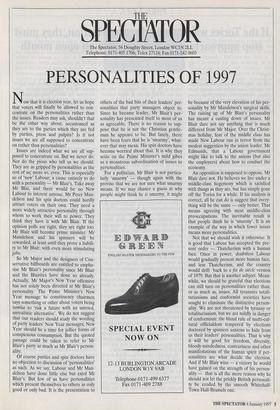SPECTATOR OR
The Spectator, 56 Doughty Street, London WC1N 2LL Telephone: 0171-405 1706; Telex 27124; Fax 0171-242 0603
PERSONALITIES OF 1997
Now that it is election year, let us hope that voters will finally be allowed to con- centrate on the personalities rather than the issues. Readers may ask, shouldn't that be the other way about; accustomed as they are to the pieties which they are fed by parties, press and pulpits? Is it not issues we are all supposed to concentrate on rather than personalities?
Issues are indeed what we are all sup- posed to concentrate on. But we never do. Nor do the pious who tell us we should. They are as gripped by personalities as the rest of us; more so, even. This is especially so of 'new' Labour; a cause entirely to do with a personality — Mr Blair's. Take away Mr Blai, and there would be no New Labour to interest anyone. Mr Peter Man- delson and his spin doctors could hardly attract voters on their own. They need a more widely attractive personality through whom to work their will to power. They think they have it with Mr Blair. If the opinion polls are right, they are right too. Mr Blair will become prime minister. Mr Mandelson and his spinners will be rewarded, at least until they prove a liabili- ty to Mr Blair, with even more stimulating jobs.
So Mr Major and the designers of Con- servative billboards are entitled to empha- sise Mr Blair's personality since Mr Blair and the Blairites have done so already. Actually, Mr Major's New Year offensive has not solely been directed at Mr Blair's personality. The Prime Minister's New Year message to constituency chairmen says something or other about voters being unwise to 'risk a future with an untried, unrealistic alternative'. We do not suggest that our readers should study the wording of party leaders' New Year messages; New Year should be a time for jollier forms of conspicuous consumption. But the quoted passage could be taken to refer to Mr Blair's party as much as Mr Blair's person- ality.
Of course parties and spin doctors have no objection to discussion of 'personalities' as such. As we say, Labour and Mr Man- delson have done little else but extol Mr Blair's. But few of us have personalities which present themselves to others as only good or only bad. It is the presentation to others of the bad bits of their leaders' per- sonalities that party managers object to. Since he became leader, Mr Blair's per- sonality has presented itself to most of us as agreeable. There is no reason to sup- pose that he is not the Christian gentle- man he appears to be. But lately, there have been fears that he is 'smarmy', what- ever that may mean. His spin doctors have become worried about' that. It is why they seize on the Prime Minister's mild gibes as a monstrous subordination of issues to personalities.
For a politician, Mr Blair is not particu- larly 'smarmy' — though again with the proviso that we are not sure what smarmy means. If we may chance a guess at why people might think he is smarmy, it might be because of the very elevation of his per- sonality by Mr Mandelson's surgical skills. The raising up of Mr Blair's personality has meant a casting down of issues. Mr Blair dare not say anything that is much different from Mr Major. Over the Christ- mas holiday, fear of the middle class has made New Labour run in terror from the modest suggestion by the union leader, Mr Edmunds, that a Labour government might like to talk to the unions (but also the employers) about how to conduct the economy.
An opposition is supposed to oppose. Mr Blair dare not. He believes we live under a middle-class hegemony which is satisfied with things as they are, but has simply gone off the Tories for a while. If his analysis is correct, all he can do is suggest that every- thing will be the same — only better. That means agreeing with most middle-class preoccupations. The inevitable result is that people think he is 'smarmy'. It is an example of the way in which fewer issues means more personalities.
Not that we should wish it otherwise. It is good that Labour has accepted the pre- sent order — Thatcherism with a human face. Once in power, doubtless Labour would gradually present more human face, and less Thatcherism, and the country would drift back to a fin de siècle version of 1979. But that is another subject. Mean- while, we should be grateful that elections can still turn on personalities rather than, or as much as, issues. All tyrannies totali- tarianisms and conformist societies have sought to eliminate the distinctive person- ality. We are not threatened by tyranny or totalitarianism, but we are mildly in danger of conformism: the bland rule of multi-cul- tural officialdom tempered by elections doctored by spinners anxious to hide from us their leaders' personalities. That is why it will be good for freedom, diversity, bloody-mindedness, contrariness and other manifestations of the human spirit if per- sonalities are what decide the election. And if Mr Blair wins — a victory he would have gained on the strength of his person- ality — that is all the more reason why he should not let the prickly British personali- ty be eroded by the smooth Whitehall- Town Hall-Brussels one.


























































 Previous page
Previous page